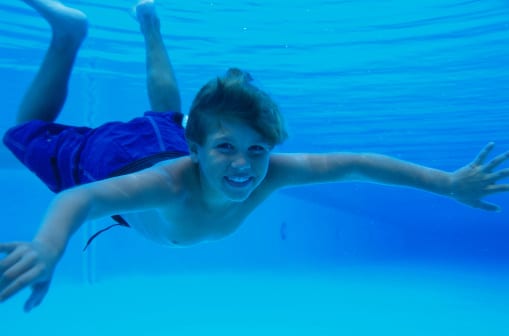For any kid, swimming is fun. I know I spent half of my childhood in a pool.
Is swimming good for children with autism?
Generally, I think it is good. I think the feeling of the water on their bodies helps to regulate children with autism. It’s soothing and adds a unique feeling that is different from an OT hug or bouncing on a trampoline. It helps to calm them.
What should we be aware of?
There are the typical swimming pool rules that every child should follow – don’t run when outside the pool and no fighting in the pool are two I can immediately think of. However, I’d like you to also be aware of one potential problem when mixing autistic kids and water.
This never happened to my child. But, one day I was discussing autism and swimming with my child’s special needs swimming instructor and she told me a frightening story. It involved a swimming instructor she knew whose autistic child had to be saved from a near drowning.
What had happened?
The instructor explained it to me this way: In her experience working with special needs kid, and especially kids with autism, sometimes she’ll have a kid that will get into pool and go under the water a lot. They’ll do this because they find the experience of being underwater very soothing. A little too soothing.
Imagine the experience of being underwater where you hold your breath and just float. The world outside is suddenly gone. Noise and confusion and parents and rules are no longer there when you sit under the water. It’s almost a relief.
Unfortunately, this child had taken that feeling of relief to the extreme and had forgotten that they had to surface in order to breathe.
Are you saying don’t take our kids into a pool?
Absolutely not. That’s not at all what I’m saying at all.
Swimming is still an excellent experience for all children. I’m an advocate of teaching your child how to swim. I believe it’s a very important skill that every child should have.
More so with our kids as it can be a very valuable OT-related experience. Swimming is soothing and calming and can help to regulate autistic kids.
All I’m really trying to say is what I’d say to any parent; exercise extreme caution around any pool or body of water, especially with autistic children who have special needs and get easily distracted.
Our child is naturally very cautious, and he took a long time to get used to swimming. He’s just now learning how to freestyle swim at age nine. There was never any doubt about our child learning how to swim. I knew to take it slowly with him and, now, I think he has the basics.
What can we do to prepare our child?
Talk about swimming rules. Here are some examples:
1. For new swimmers, do not go into the water without an adult.
2. For more experienced swimmers, I’d say they’d have to permission from an adult before they go plunging into the family pool.
3. No running around a pool (Yep, I broke this rule hundreds of time when I was a kid).
4. No “horse play” in the water. Trust me, things can go wrong in any swimming situation.
What about swimming lessons?
With your autistic child, I’d first consider how you think your child would receive swimming lessons. For example, our child did not learn well in the group swimming lessons in the large pool at our aquatic center. He was constantly distracted by all the noise, the size of the pool, and all the other kids around him.
Additionally, I quickly learned that traditional swimming instruction was not well suited for my child. In those group situations, my child was getting about a minute to try something with the instructor, and then the instructor had to get the next kid.
What did we do?
We began private swimming lessons. At our aquatic center, they have a smaller (and warmer) “therapy pool” where special needs instructors can give private swimming lessons. Yes, it does cost more. I realize cost may be a consideration for you.
What’s a lower cost option for private lessons?
Well, I’ll give you the one I did…I gave my son his own lessons.
I’m an advanced swimmer (Remember that whole growing up in a pool thing? I wasn’t kidding. To this day, I swim twice a week for exercise.)
For about two years, I paid a special rate that I had negotiated with the aquatic center and I took my son to the therapy pool and worked with him myself.
Do I still do that now?
This year I wanted my son to really learn the actual swimming stokes because he expressed a desire to join the special needs swimming club. However, he couldn’t join until he had learned to swim free style.
I felt a real swimming instructor was a better option in order to break down the teaching of a swimming stroke. They have experience in that area that I do not have. And, whether my son ends up on a swimming team or not, I believe the experience has been invaluable.
In my next blog, I will discuss more options for swimming.
To Find Kimberly Kaplan:
www.kimberlykaplan.com
www.smashwords.com or Amazon Kindle ebook “A Parents’ Guide to Early Autism Intervention”
Twitter: @tipsautismmom





